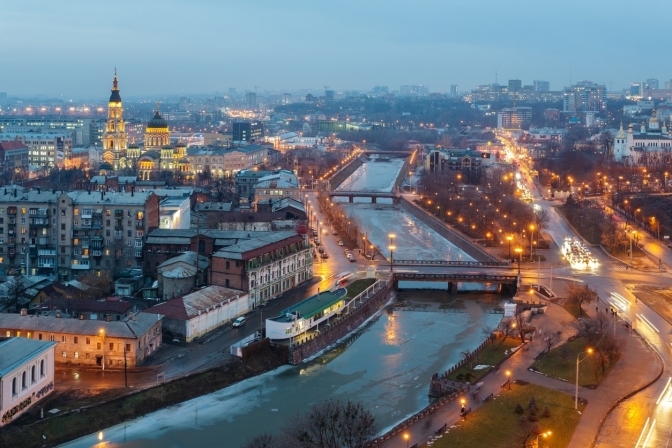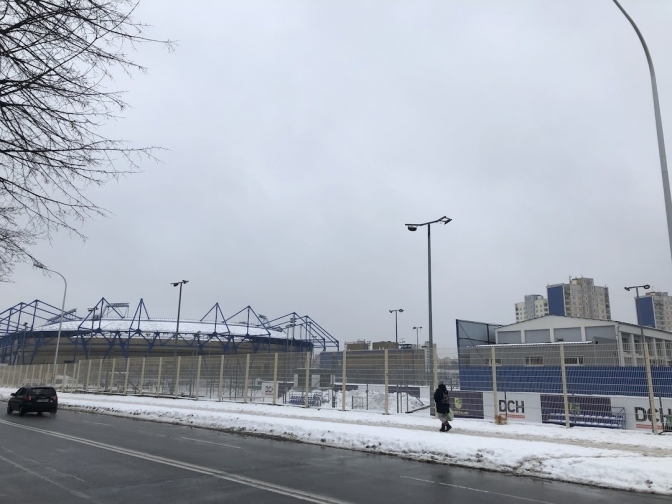
Kharkiv, Ukraine Photo: flypgs.com
By Joe Lindsley, Kateryna Bortniak, and Vitalii Holich
Kharkiv, Ukraine – In 2014, months after Ukraine’s grassroots Revolution of Dignity sent the pro-Moscow regime fleeing to Russia, Moscow took Crimea and moved to occupy portions of eastern Ukraine. Russian-backed fighters successfully took the region of Donbas, and were pushing for more, including Kharkiv, a city of one – million-plus people. During a tense few days in mid-April 2014, Russians occupied Kharkiv city hall and raised the Russian flag.
«At that time [2014], it was totally possible to occupy Kharkiv,» Kharkiv civic leader Ihor Balaka tells us. «I still remember that there was no defence infrastructure near the city, nothing functioned among the military vehicles in warehouses, there were no weapons.»
And yet for the reasons Ihor explains below, the people Kharkiv swiftly pushed back and ousted the invaders. and today is a thriving Ukrainian city. Despite some scattered bombs and attacks in the rest of 2014 and 2015, Ukraine’s «second city» is now peaceful and increasingly prosperous – and, though it is Russian-speaking, it is Ukrainian in attitude.
«If this would happen in Kharkiv, I can say that every other building would be a fortress,» he says.
Ihor Balaka is vice-president of the association of the international real estate agents and the interviewer in the program «PoBalakayemo» [«Let’s talk»] in the Kharkiv press media club. He’s also deputy head of the Kharkiv Office of the European Business Association.
Read also: I am useless for war because raised for peace, or how we joked about the war
1. The presence of optimistic young people with an entrepreneurial spirit.
Kharkiv, a city of more than 230,000 students, is a youthful metropolis, with many small and micro-entrepreneurs who are accustomed to work for themselves. «On Donbas, the situation is quite different. Most people there are working on the plants, and they hope that someone would give them all they need.»
And since the city fought off Russian attackers in 2014, «many pro-Russian people left Kharkiv for Donbas, Russia or other areas, because they understood that there would be no Russia here. This was a kind of a natural outflow of those who were the most radical. Most of those who remained here were the elderly people or less radical ones who are indifferent of where they wanted to live. But the number of pro-Ukrainian people rose significantly.
«My son was twelve in 2014 and didn’t understand much at that time, but now he realises everything, makes decisions, and as I see on the example of his friends, the vast majority of the young aged population in Kharkiv perceives Kharkiv only as Ukraine.»
2. Football ‘hooligans’: the fans of Kharkiv club Metalist

In Ukraine, football ‘hooligan’ has a positive connotation, because all around the country working class football fans rallied to oppose Russian invasion. The fans of Kharkiv football club «Metalist,» a storied club founded in 1925, showed their organised opposition to pro-Russian rebels. «There were significant conflicts near the stadiums where these fans fought the people who came to kill those with a pro-Ukrainian position, so the city showed resistance.»
3. Benevolent, atypical oligarchs and business leaders who support volunteer citizen battalions
Third, some influential local businessmen organised campaigns to support the defenders of the territorial integrity of Ukraine. They supplied the volunteer battalions with the necessary equipment and finance, sometimes even gave suitcases of money. «Funds for this purpose were created immediately,» Ihor says. «These were not the usual oligarchs, but some representatives of local big business, who understood that they can lose everything, so they joined the resistance. Some names are Serhii Polituchyi, Valerii Dyoma, Vsevolod Kozhemyaka and many others.»
4. Leaders and people who cannot be persuaded to side with Moscow
In 2014, some civic figures hesitated about which side to support, and even then Kharkiv successfully kept away the Russians. That hesitation does not exist how, Ihor says.
«The main thing is that the [current] mayor [Ihor Terekhov] stated strongly that Kharkiv remains and will be a Ukrainian city, and Russia mustn’t encroach on it. This was a crucial sign for the patriotic component of our city, that no ‘agreements’ will take place.
In 2014, Gennady Kernes, whom Ihor describes as a «pretty interesting mayor,» the city’s long-time chief who died in 2020, at first negotiated to «hand over» the city to Russia, but after speaking to some of his friends-oligarchs, he changed the side, and Kharkiv remained a Ukrainian city. In late April, after Ukrainians had retaken the city hall, someone whom many think was a Russian sympathizer attempted to assassinate Mayor Gennady while he was hiking; he spent the rest of his life in a wheelchair.
Ihor says that even those who were pro-Russian in 2014 can now see what happened, eight years on, after Moscow occupied Donbas and its major city of Donetsk:
«I can say that Kharkiv is pro-Ukrainian, and even many of those who were pro-Russian saw how in the occupied Donbas people are not living but surviving, and changed their point of view. In only 2021, Forbes said Donestk was Ukraine’s best city for business; now it is in manys an economic wasteland.
5. The help of all of Ukraine, its army and its people
In 2014, in the chaotic months after the Revolution of Dignity, organizationally Ukraine was not so strong as it is today. Even so, and even though the Russian invasion in 2014 caught many authorities by surprise, a few key leaders helped rally the defenses. Arsen Avakov, a political and civic leader in Kharkiv, who was Ukraine’s Minister of Internal Affairs at that time, in the post-Euromaidan administration, managed to immediately bring a special force unit «Jaguar» from Vinnytsia, in west-central Ukraine.
With its help, he freed the building of Kharkiv State Administration, which resulted in arrest of almost eighty rebels. Today, after eight years of assistance from key Western allies, Ukraine’s military is well-trained, mechanisms are established for the mobilization of civilian volunteers, and the country feels much more prepared. Ihor laments military budget cuts in the past years but says it’s still leagues ahead of where things were in 2014.
And this is a key point: Despite believing that Kharkiv is ready for any potential Russian invasion, Ihor Balaka does’t think it is likely.
«But, in my personal point of view, vast majority of people don’t believe that military actions will start, and [we] perceive this situation rather like battle between Russia and the United States, because Putin raised stakes to sky-high, frightened the whole world, and the world said «That’s enough!» If before, they [Western countries] demonstrated some weakness, now they stated that they will respond. Maybe, everything is presented more in the dark shades, because as I watch American media, I see that the actual situation is more calm than it’s shown there.»
By Joe Lindsley, Kateryna Bortniak and Vitalii Holich
Follow Lviv Now on Facebook and Instagram. To receive our weekly email digest of stories, please follow us on Substack.
Lviv Now is an English-language website for Lviv, Ukraine’s «tech-friendly cultural hub.» It is produced by Tvoe Misto («Your City») media-hub, which also hosts regular problem-solving public forums to benefit the city and its people.











